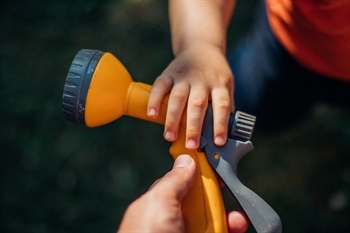As Chicago’s collar counties grapple with one-in-a-lifetime water challenges, coordinated groups are discussing a path forward

Image courtesy Flickr user vgm8383 (CC)
There’s no doubt about it: many communities in Northeast Illinois are at a pivot point with their water supply. From ever-increasing rainfall exacerbating urban flooding levels, to threats to drinking water quality, the Chicago region is faced with decisions that will echo for generations to come. The good news? No one community has to face these challenges alone.
In the Fox River basin, droughts threaten shallow groundwater resources. In order to adequately prepare for future droughts, a significant amount of data and community resources are required. In the southwest suburbs, aquifer levels have spurred a growing sense of urgency to explore alternative water sources. Switching away from groundwater to another source—such as Lake Michigan or local rivers—is a big, expensive decision.
These and other water challenges require significant investment in infrastructure, technical expertise, dedication from community leaders, and political will.
Is there an option that can make these decisions easier and more efficient? Yes. Coordination.
Two Groups Discuss a Way Forward
Depending on where you live, chances are that your drinking water passes through infrastructure that is 50 to 100 years old. To put that into context, folks were likely making decisions about your water sometime between the presidencies of Woodrow Wilson and Richard Nixon.
Folks were likely making decisions about your water sometime between the presidencies of Woodrow Wilson and Richard Nixon.
This is not the first time our region has faced similar threats and made critical decisions about water. For example, DuPage County was primarily developed for agriculture, but a growing population put increasing strain on local groundwater resources. In response, communities there began investigating the feasibility of switching to Lake Michigan water, and, in 1984, the DuPage Water Commission signed an agreement to purchase water wholesale from the Chicago Department of Water Management.
Similar cooperatives today are charting a path forward. What they decide will fundamentally impact a resource that current and future residents use and interact with on a daily basis. These are critical moments and critical conversations that will impact the region for generations to come.
So who are these groups discussing something as vital as their communities’ water resources? Meet the Northwest Water Planning Alliance and the Southwest Water Planning Group, two collaboratives working toward a water future for their parts of the region.
Northwest Water Planning Alliance
In August 2010, a group of groundwater-dependent communities in northeastern Illinois formed the Northwest Water Planning Alliance. At the time, Aurora Mayor Tom Weisner was particularly concerned about maintaining high-quality drinking water in the region. In this context, the Northwest Water Planning Alliance emerged as a platform for collaborative planning and management. The governing structure of this group represents nearly 80 municipalities across five Chicago-area counties: DeKalb, Kane, Kendall, Lake, and McHenry. This area roughly aligns with Illinois’ Fox River Basin, though this does not limit the group’s membership.

courtesy Grahford (Flickr, CC BY-NC 2.0)
The Northwest Water Planning Alliance has primarily focused on stewarding the Fox River and groundwater resources that the region relies on. It allows elected officials, utility and resource managers, and others to learn about their water resources together. By facilitating conversations about shared and similar water sources and challenges, it strengthens the regional response and empowers communities to develop best practices.
The group began with a commitment to reducing outdoor water usage and has since led campaigns to use road salts sensibly and other conservation initiatives. In addition to these efforts, the Northwest Water Planning Alliance works with external partners, including the Chicago Metropolitan Agency for Planning, Illinois Department of Natural Resources, Illinois-Indiana Sea Grant, Illinois State Water Survey, the U.S. Geological Survey and others. These groups are an essential resource for Northwest Water Planning Alliance members, as they inform future strategies for the region in the years ahead.
Southwest Water Planning Group
What is an aquifer?
Aquifers are naturally occurring areas—generally several hundred to more than a thousand feet underground—where large quantities of water collect. Although you might envision an underground lake or river, aquifers are more like sponges where water fills the spaces between sand, gravel and sandstone. We access this "groundwater" by drilling wells into the aquifer and pumping water to the surface.
The Southwest Water Planning Group was formed in 2019, with members primarily representing groundwater-reliant communities and industries in western Will County. This group’s primary goal is to work together to ensure a sustainable water supply. In the near future, the region’s deep sandstone aquifer is in serious danger of running dry, due in part to the Sandwich Fault Line, which limits the ability for the aquifer to be recharged by rain. Modeling from the Illinois State Water Survey, which supplies the Southwest Water Planning with up-to-date, science-based data, has shared modeling results indicating that these communities are moving closer to a day when their high-capacity municipal wells may be inoperable—a serious threat to water supply. While the time horizon ranges between 10 to 30 years or more, one thing is certain: these communities can’t tap the deep sandstone aquifer forever.
In response to this problem, Joliet is pursuing a switch from groundwater to Lake Michigan water by 2030, and nearby communities in western Kendall County and southern Kane County also are searching for solutions to this shared long-term risk to their groundwater supply. As Joliet pushes forward with becoming a Lake Michigan permittee, nearby communities will need to make a critical decision—whether to work together on a regional solution or move forward with securing their own alternative water supply. Each municipality’s decision will affect the size and cost of a shared water system, which makes the work of the Southwest Water Planning Group essential to promote interregional communication.
Together, The Southwest Water Planning Group is learning about potential governance structures for shared water systems, management requirements associated with access to Lake Michigan water, and water conservation practices to reduce costs. By participating in these conversations, these communities can make an informed decision on their future water supply.
Working for a Water Future

courtesy Ivan Radic (Flickr, CC BY 2.0)
Many communities in the northwest and southwest of our region are wrestling with how to ensure they have a sustainable water source now and into the future. And it's important that they get it right because the decisions they make today will impact generations to come!
As exemplified by these two collaboratives at work in the Chicago area, resource and information-sharing is key. Communication is key. Coordination is key. And so is a willingness to have honest, tough conversations.
By investing in options that safeguard water quality and quantity, the next generation of residents will be enabled to face the great challenges that await them—together.
Meg Fredericks is pursuing her Masters of Urban Planning and Policy at the University of Illinois at Chicago, with a focus on environmental planning. She is interested in urban climate impacts, particularly with respect to stormwater, flooding, green infrastructure, extreme heat, and all things maps.